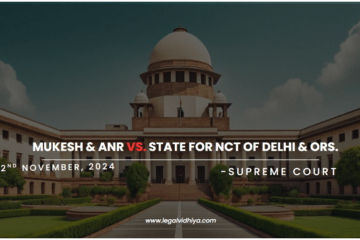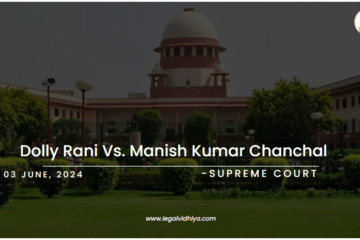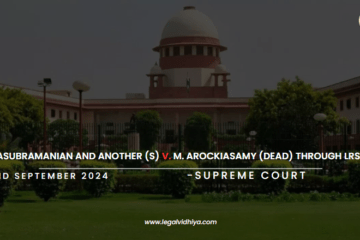
| CITATION | 2024 INSC 339 |
| DATE OF JUDGMENT | 25th April 2024 |
| COURT | Supreme Court of India |
| APPELLANT | Shri Mallikarjun Devasthan, Shelgi |
| RESPONDENT | Subhash Mallikarjun Birajdar and others |
| BENCH | A.S. Bopanna, Sanjay Kumar, JJ. |
INTRODUCTION
The famous Supreme Court case of Devasthan Shelgi vs Subash Mallikarjun Birajdar rotated around one of the Change Reports which considered the electoral process of the administrators (Vahiwatdar) and trustees of Shri Mallikarjun Devasthan Shelgi public trust. When the main contention of the complainants was that it took more than fifteen years to file the Succession application after the recent owner of Vahiwatdar’s death, this was challenged.
The Bombay High Court rejected the acceptance of these Late Reports, stating the reason for the invalidity was because the first report wasn’t filed within the prescribed time which is the order condoning the delay in presentation. Nevertheless, the Supreme Court decided on the practical issue adopting the view that since the delay was curable the Vahiwatdar’s new appointment would not be void even if there was a time limit delayed. The apex court pointed out that the devotees’ objection was only motivated by resistance to the founder’s family and not the real issue, and what the court can do is to come out with a remedy under the rule of law to settle the issues of temple maintenance.
FACTS OF THE CASE
- The Shri Mallikarjun Devasthan Shelgi was registered as a public trust in 1952 by Mallikarjun Mahalingappa Patil according to the Bombay Public Trusts Act, 1950 (now known as the Maharashtra Public Trusts Act, 1950). The upkeep and maintenance of the Shri Mallikarjun Temple at Shelgi, North Solapur Taluka, was the goal of the trust.
- The application stated that Mallikarjun Mahalingappa Patil would be the Vahiwatdar (administrator) of the trust, the eldest male member of his family takes over as trustee and manager. The Vahiwatdar also had the power to appoint others as trustees when necessary.
- Ashok Mallikarjun Patil, the eldest son of Mallikarjun Mahalingappa Patil, succeeded him as the Vahiwatdar on his death in 1992. Ashok Mallikarjun Patil passed on February 16, 1997, and his brother Jagdishchandra Mallikarjun Patil succeeded him as Vahiwatdar.
- The second son of Mallikarjun Mahalingappa Patil, Satish Patil, had no interest in becoming the Vahiwatdar, while Jagdishchandra was the third son. Thus, Jagdishchandra assumed the role even though not being the eldest male member of the family.
ISSUES RAISED
1. What is the validity of the acceptance of Change Reports about the Vahiwatdar and Trustees of Shri Mallikarjun Devasthan, Shelgi, a Public Trust?
2. Can the delay in filing the Change Report by Jagdishchandra automatically invalidate his assumption as Vahiwatdar after the death of the previous Vahiwatdar?
3. Does the delay in filing a Change Report impact the validity of the changes in the Trust administration, or is it a curable defect?
4. Can devotees who are not related to the founder challenge the appointment of Trustees and the succession to the post of Vahiwatdar, when the eldest male of the founder has no objections?
CONTENTIONS OF APPEALENT
- Jagdishchandra Mallikarjun Patil, the third son of the founder Mallikarjun Mahalingappa Patil, assumed the role of Vahiwatdar (Administrator) of the Trust after the death of his elder brother Ashok, even though he was not the eldest male member of the family. This was done with the consent of his other brothers, including the eldest brother Satish, who had no interest in taking over as Vahiwatdar.
- Jagdishchandra filed a Change Report (No. 899 of 2015) belatedly, after a delay of over 17 years, to report his assumption as Vahiwatdar. He also filed a delay condonation application along with the Change Report.
- The Deputy Charity Commissioner accepted the Change Report and condoned the delay, although no separate order was passed explicitly condoning the delay.
- Jagdishchandra later co-opted four other persons as Trustees by filing another Change Report (No. 1177 of 2017), which was also accepted by the authorities.
The appellant argued that the delay in filing the Change Report should not make Jagdishchandra’s assumption as Vahiwatdar or the appointment of Trustees invalid because the delay was curable and was condoned by the authorities.
CONTENTIONS OF REPONDENT
- They questioned the eligibility of Jagdishchandra Mallikarjun Patil to be the Vahiwatdar (Administrator) of the Trust, alleging that he had “unlawfully, without having any kind of relation, by cheating and misleading villagers, society as well as the Hon’ble Court, filed the Change Report No. 899 of 2015 and obtained approval.”
- They alleged that the Deputy Charity Commissioner had not made a proper inquiry on the Change Report filed by Jagdishchandra.
- They claimed that after the death of Ashok Mallikarjun Patil, the functioning of the Trust was being handled by the villagers, and they had been looking after the worship and other programs, while Jagdishchandra was just overseeing the Temple.
- For the first time before the High Court, they raised the ground of delay of more than 17 years on the part of Jagdishchandra in filing the Change Report after the death of Ashok Mallikarjun Patil on 16.02.1997.
- They challenged the acceptance of both Change Reports (No. 899 of 2015 and No. 1177 of 2017) related to Jagdishchandra’s appointment as Vahiwatdar and his co-option of four other persons as Trustees, respectively.
The respondents, who were devotees of the Shri Mallikarjun Temple at Shelgi, basically opposed to the claim of Jagdishchandra’s eligibility and the alleged lack of proper inquiry by the authorities in accepting the Change Reports.
JUDGEMENT
The Supreme Court’s decision put away the Bombay High Court’s verdict and supported the acceptance of the Change Reports regarding Vahiwatdar and Shri Mallikarjun Devasthan Shelgi public trustees.
The apex court took a practical stand on the issue, ruling that the delay of 17 years was unreasonable though is a curable defect and does not automatically call into question the validity of the appointment of the new Vahiwatdar. The court stated that the rule even before its amendment in 2017, allows the court to condone such delay upon reasonable cause being shown.
Notably, the court held that the objecting devotees appeared to have been averse to the founder’s family more than they were regarding the trust’s administration. This reiterated that there were two separate statutory remedies to the irregular temple maintenance, but not to go back and forth with the Change Reports.
ANALYSIS
The ratio decidendi of the present case boils down to the provisions of Section – 6 of the Act which has also been termed as the civil court case by the Supreme Court in the judgement of Shri Mallikarjun Devasthan v. Subhash Mallikarjun Birajdar & Ors. addressed the matters relating to acceptance of Change Reports in relation to the Vahiwatdar (Administrator) and Trustes for a Public Trust which was established under the Maharashtra Public Trusts Act, 1950. While setting aside the acceptance of these Change Reports, they based it entirely on the premise that there was no order that condone the delay of 17 years in filing the first Change Report.
Thus, the Supreme Court demonstrated a purely practical view of the matter and held that failure to file a Change Report does not necessarily mean that the new Vahiwatdar or the Trustees have not properly assumed office. The Court underscored the fact that the Act does not compel a court to invalidate instantaneously in such circumstances and the delay is patentable under the provisions of the Act. The Court also pointed out that in cases where recourse to the 2017 amendment was an issue the authority could have condoned the delay by relying on the Limitation Act.
The Court dismissed a hyper-technical approach adopted by the High Court, with an over-emphasis on the delay aspect while it hasn’t any relevance to the changes in the manner of operating the Trust. It pointed out that the matter raises objections that the parties that instituted appeals appeared to have a concern with the very registration of the Trust which had become conclusive. In particular, taking a justice-oriented action, the Supreme Court decided to eliminate the High Court’s decision and stated its willingness to accept the Change Reports.
CONCLUSION
The jurisdiction given by the Supreme Court in the Mallikarjun Devasthan Shelgi case embodies a balanced and pragmatic method of settling disputes concerning public trusts. The court approves the belated filing of the Change Report, casting doubt by stressing that procedural awkwardness should be the sole reason for disregarding the administrative changes of the trust.
Certainly, the court disallowed personal malice making an appearance as public concern, and wanted the aggrieved people to utilize the statutory remedies for genuine reasons relating to trust administration. It leads to judicial economy and the smooth working of public trusts, therefore. This decision achieves a fine balance between the formal guidelines for the treatment of public trusts and takes into account the actual practice of public trusts, which serves as a commendable precedent for future cases.
REFERENCES
- SCC Online
- https://indiankanoon.org/doc/162793268/
- https://www.advocatekhoj.com/library/judgments/announcement.php?WID=17525
This Article is written by Aman Raj, a student of Chanakya National Law University, Patna (CNLU); Intern at Legal Vidhiya.
Disclaimer: The materials provided herein are intended solely for informational purposes. Accessing or using the site or the materials does not establish an attorney-client relationship. The information presented on this site is not to be construed as legal or professional advice, and it should not be relied upon for such purposes or used as a substitute for advice from a licensed attorney in your state. Additionally, the viewpoint presented by the author is of a personal nature.




0 Comments